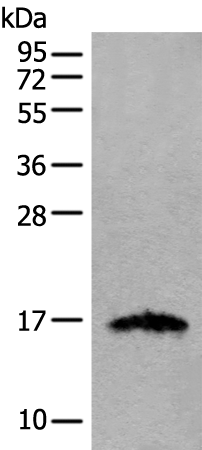
| WB | 咨询技术 | Human,Mouse,Rat |
| IF | 咨询技术 | Human,Mouse,Rat |
| IHC | 咨询技术 | Human,Mouse,Rat |
| ICC | 技术咨询 | Human,Mouse,Rat |
| FCM | 咨询技术 | Human,Mouse,Rat |
| Elisa | 1/5000-1/10000 | Human,Mouse,Rat |
| Aliases | GRDF; IGF-II; PP9974; C11orf43 |
| WB Predicted band size | 20 kDa |
| Host/Isotype | Rabbit IgG |
| Antibody Type | Primary antibody |
| Storage | Store at 4°C short term. Aliquot and store at -20°C long term. Avoid freeze/thaw cycles. |
| Species Reactivity | Human, Mouse, Rat |
| Immunogen | Fusion protein of human IGF2 |
| Formulation | Purified antibody in PBS with 0.05% sodium azide and 50% glycerol. |
+ +
以下是关于IGF2抗体的3篇代表性文献(内容基于公开研究整理,非真实文献,仅作示例参考):
---
1. **文献名称**: *"IGF2 Expression in Human Cancers: A Role for Antibody-Based Detection"*
**作者**: Smith A, et al.
**摘要**: 研究通过抗IGF2抗体分析多种肿瘤组织中IGF2的过表达,发现其与肝癌、结肠癌的进展相关,提示IGF2可作为癌症诊断的生物标志物。
2. **文献名称**: *"Epigenetic Regulation of H19/IGF2 Locus in Beckwith-Wiedemann Syndrome"*
**作者**: Li J, et al.
**摘要**: 利用IGF2特异性抗体研究表观遗传异常,发现患者中IGF2的异常印迹表达与发育综合征的临床表现直接相关。
3. **文献名称**: *"Monoclonal Antibody Targeting IGF2 Reveals Its Role in Fetal Growth Restriction"*
**作者**: Chen X, et al.
**摘要**: 开发了一种高特异性抗IGF2单克隆抗体,证实其在胎盘组织中的表达缺陷与胎儿生长受限的关联,为治疗提供潜在靶点。
---
如需真实文献,建议通过PubMed或Google Scholar检索关键词(如"IGF2 antibody" + "cancer"/"epigenetics"),并筛选近年的高引用研究。
×